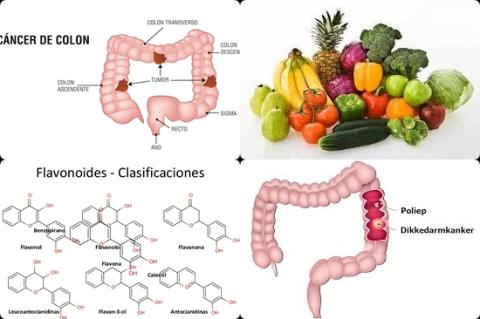
Objectives:
Do dietary flavonoid intake reduce colorectal cancer risk?
Study design:
This review article included 5 prospective cohort and 7 case-control studies with a tolal of 17,481 cases (persons with colorectal cancer) and 740,859 controls (persons without colorectal cancer).
All studies were adjusted for a wide range of potential confounders of colorectal cancer, such as age, gender, BMI, physical activity, family history of colorectal cancer, education, energy intake, alcohol, fiber intake, red and processed meat intake, tobacco, aspirin and non-steroidal anti-inflammatory drug.
There was no publication bias.
Results and conclusions:
The investigators found that there was no significant association between colorectal cancer risk and total flavonoid intake, with a pooled OR from the combination of the included studies of 0.73 [95% CI = 0.48-1.10] for the highest category of intake vs. the lowest category. Similarly, no association between the intake of flavanones or flavan-3-ols and the risk of colorectal cancer was observed.
The investigators found in subgroup analysis of both cohort and case-control studies that when compared with the lowest, the highest intake of dietary flavonols significanty reduced risk of colorectal cancer with 30% [OR = 0.70, 95% CI = 0.54-0.90]. Nevertheless, substantial heterogeneities existed across the studies.
However, this reduced risk was not significant in cohort studies [pooled RR = 1.00, 95% CI = 0.92-1.08].
The investigators found in subgroup analysis of both cohort and case-control studies that when compared with the lowest, the highest intake of dietary flavones significanty reduced risk of colorectal cancer with 21% [OR = 0.79, 95% CI = 0.83-0.99]. Nevertheless, substantial heterogeneities existed across the studies.
However, this reduced risk was not significant in cohort studies [pooled RR = 1.02, 95% CI = 0.94-1.11].
The investigators found in subgroup analysis of both cohort and case-control studies that when compared with the lowest, the highest intake of dietary anthocyanidins significanty reduced risk of colorectal cancer with 22% [OR = 0.78, 95% CI = 0.64-0.95]. Nevertheless, substantial heterogeneities existed across the studies.
However, this reduced risk was not significant in cohort studies [pooled RR = 1.00, 95% CI = 0.91-1.10].
The investigators found dose-response meta-analysis indicated that an increment of dietary flavones intake of 1 mg per day significantly reduced risk of colorectal cancer with 9% [pooled OR = 0.91, 95% CI = 0.84-0.99].
The investigators found dose-response meta-analysis indicated that an increment of dietary flavonols intake of 10 mg per day significantly reduced risk of colorectal cancer with 14% [pooled OR = 0.86, 95% CI = 0.76-0.97].
The investigators found that high intake of flavonols significantly decreased risk of colon cancer with 20% [OR = 0.80, 95% CI = 0.68-0.94].
Significantly means that there is an association with a 95% confidence.
The investigators found that high intake of flavones significantly decreased risk of rectal cancer with 18% [OR = 0.82, 95% CI = 0.70-0.97].
Significantly because OR of 1 was not found in the 95% CI of 0.70 to 0.97. OR of 1 means no risk/association.
The investigators concluded that high intake of dietary flavonols, flavones and anthocyanidins may decrease the risk of colorectal cancer. May decrease because substantial heterogeneities existed across the studies and the reduced risk was not significant in cohort studies.
Original title:
Dietary Flavonoids and the Risk of Colorectal Cancer: An Updated Meta-Analysis of Epidemiological Studies by Chang H, Lin Lei L, […], Guohua Zhao G.
Link:
https://www.ncbi.nlm.nih.gov/pmc/articles/PMC6073812/
Additional information of El Mondo:
Find more information/studies on review article/significant/publication bias, colorectal cancer and flavonoids right here.
The results of a review article are only reliable when they are also found in cohort studies. Thus, the significantly reduced risk must be found in both patient-control studies (more sensitive to errors) and cohort studies (less susceptible to errors).